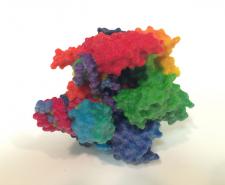The gene editor CRISPR won’t fully fix sick people anytime soon. Here’s why
By Jocelyn Kaiser,
Science/AAAS
| 05. 03. 2016
Untitled Document
This week, scientists will gather in Washington, D.C., for an annual meeting devoted to gene therapy—a long-struggling field that has clawed its way back to respectability with a string of promising results in small clinical trials. Now, many believe the powerful new gene-editing technology known as CRISPR will add to gene therapy’s newfound momentum. But is CRISPR really ready for prime time? Science explores the promise—and peril—of the new technology.
How does CRISPR work?
Traditional gene therapy works via a relatively brute-force method of gene transfer. A harmless virus, or some other form of so-called vector, ferries a good copy of a gene into cells that can compensate for a defective gene that is causing disease. But CRISPR can fix the flawed gene directly, by snipping out bad DNA and replacing it with the correct sequence. In principle, that should work much better than adding a new gene because it eliminates the risk that a foreign gene will land in the wrong place in a cell's genome and turn on a cancer gene. And a CRISPR-repaired gene...
Related Articles
By Arthur Lazarus, MedPage Today | 01.23.2026
A growing body of contemporary research and reporting exposes how old ideas can find new life when repurposed within modern systems of medicine, technology, and public policy. Over the last decade, several trends have converged:
- The rise of polygenic scoring...
By Stephanie Pappas, LiveScience | 01.15.2026
Genetic variants believed to cause blindness in nearly everyone who carries them actually lead to vision loss less than 30% of the time, new research finds.
The study challenges the concept of Mendelian diseases, or diseases and disorders attributed to...
By David Cox, Wired | 01.05.2026
As he addressed an audience of virologists from China, Australia, and Singapore at October’s Pandemic Research Alliance Symposium, Wei Zhao introduced an eye-catching idea.
The gene-editing technology Crispr is best known for delivering groundbreaking new therapies for rare diseases, tweaking...
By Josie Ensor, The Times | 12.09.2025
A fertility start-up that promises to screen embryos to give would-be parents their “best baby” has come under fire for a “misuse of science”.
Nucleus Genomics describes its mission as “IVF for genetic optimisation”, offering advanced embryo testing that allows...




